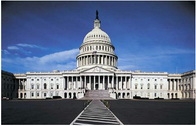Advertisement
Senate Committee Convenes to Grade Dodd-Frank Progress

Regulators gathered in Washington, D.C. on Thursday to testify before the U.S. Senate Committee on Banking, Housing and Urban Affairs to discuss the fallout of Dodd-Frank Wall Street Reform, as well as the recent Basel III ruling implemented by a multi-agency coalition. The goal of the hearing, "Mitigating Systemic Risk Through Wall Street Reforms," was to analyze and determine whether the Dodd-Frank ruling had, in essence, eliminated the notion of Too Big to Fail from capital markets. Sen. Michael Crapo (R-ID) stated early on that he feels that Dodd-Frank reforms have failed in defanging Wall Street, as well as aiding the U.S. economy, citing that better attention should be paid to regulators monitoring banks’ debt ratios and how to deal with short-term funding.
Panelists called before the Committee to testify included Mary Miller, Under Secretary for Domestic Finance for the U.S. Department of the Treasury; Daniel Tarullo, Governor of the Board of Governors of the Federal Reserve System; Martin Gruenberg, Chairman of the Federal Deposit Insurance Corporation (FDIC); and Thomas Curry Comptroller of the Currency for the Office of the Comptroller of the Currency (OCC).
“It’s important that the implementation of capital standards and early liquidation are done properly without overburdening our system and not placing the United States markets at a competitive disadvantage,” said Sen. Crapo.
Mary Miller, Under Secretary for Domestic Finance with the U.S. Department of the Treasury, championed the establishment of the Consumer Finance Protection Bureau (CFPB), stating that the CFPB “has taken important steps to provide clarity on financial products for American consumers and rein in unfair, deceptive, and abusive practices.”
The expectation is that by the close of 2013, full implementation of the Dodd-Frank Act is expected to go into effect. The general sentiment of those testifying before the Committee is that the Dodd-Frank reforms that have taken place have aided other courses of reform and that through further vigilance, further reform and refinement of current policy can aid in enhanced economic recovery.
“Although the Dodd-Frank Act provides additional tools to address the failure of a systematically important broker-dealer,” said Daniel Tarullo, member of the Board of Governors of the Federal Reserve. “The existing bank and broker-dealer regulatory regimes have not been designed to materially mitigate these systemic risks. Continued attention to these potential vulnerabilities is needed, both here in the United States and abroad.”
Sen. Crapo stated that he’s somewhat surprised by the outpouring of a bipartisan consensus.
“Some elements of Dodd-Frank may need to be fixed,” Sen. Crapo said.
Recent hearings have resulted in Ben Bernanke, Chairman of the Federal Reserve discussing the need for Dodd-Frank reform, outlining possible avenues for improvement including end-user exemption, swap pushout and certain community bank matters.
About the author




